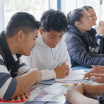Learner agency
Suggestion for implementing the strategy ‘Find out about UDL’
On this page:
Go to top of current page: Learner agency
Go to top of current page: Learner agency
The goal of UDL
The goal of UDL
Learner agency is about having the power, combined with choices, to take meaningful action and see the result of those decisions.
It … is about learners having the understanding, ability and opportunity to be part of the learning design and taking action to intervene in the learning process to become effective lifelong learners.
Derek Wenmoth (2021)
Characteristics of learner agency
Characteristics of learner agency
The UDL Guidelines support the development of learner agency by guiding the design of environments where learners can become more:
- purposeful – learners have confidence in their own ability and make decisions to support their learning
- reflective – learners assess what supports learning and what gets in the way and make adjustments
- resourceful – learners draw on strengths, skills, cultural knowledge and experience, and available tools to support learning
- authentic – learners connect new ideas to their lived experience and develop deeper understanding of the world
- strategic – learners set clear goals, monitor progress, and adapt plans as needed
- action-oriented – learners initiate and collaborate in efforts to meet their goals.
Source: The goal of UDL – Learner agency: UDL Guidelines 3.0 | CAST (2024) (opens in a new tab/window)
Conditions for agency
Conditions for agency
Designing learning environments that support learner agency requires:
- recognising culture and identity – acknowledge and affirm the diverse cultural backgrounds, experiences, and identities that shape how learners engage and express agency
- continually examining educator-learner relationships – reflect on power dynamics and foster respectful, reciprocal interactions that value learner voice
- creating space for meaning-making – provide opportunities for learners to engage with content individually and collaboratively through dialogue, reflection, and inquiry
- examining bias and barriers – identify and address biases or systemic structures that may limit some learners’ ability to participate fully and authentically in the learning process.
Source: The goal of UDL – Learner agency: UDL Guidelines 3.0 | CAST (2024) (opens in a new tab/window)
Barriers to agency in the design
Barriers to agency in the design
Look for barriers in the design, not the learner.
UDL aims to change the design of the environment rather than to situate the problem as a perceived deficit within the learner.
UDL Guidelines 3.0 | CAST (2024)
Checking for barriers
Checking for barriers
Check for barriers and unnecessary challenges to learner agency created by the design of teaching and learning.

Source: Chrissie Butler (2023)
Useful resources
Useful resources

The goal of UDL: Learner agency
An introduction to learner agency on the UDL Guidelines website.
Publisher: CAST (2024)
Next steps
More suggestions for implementing the strategy “Find out about UDL”:
-
Current page Learner agency
Return to the guide “Universal Design for Learning”

How to use this site
Guide to Index of the guide: Universal Design for Learning
Understand:
- Why UDL is valuable
-
Find out about UDLShow suggestions for Find out about UDL
Strategies for action:
-
Design multiple means of EngagementShow suggestions for Design multiple means of Engagement
-
Design multiple means of RepresentationShow suggestions for Design multiple means of Representation
-
Design multiple means of Action and ExpressionShow suggestions for Design multiple means of Action and Expression
-
How to plan using UDLShow suggestions for How to plan using UDL
-
Design considerations in primary settingsShow suggestions for Design considerations in primary settings
-
Design considerations in secondary settingsShow suggestions for Design considerations in secondary settings
-
Design considerations in NCEA assessmentsShow suggestions for Design considerations in NCEA assessments
